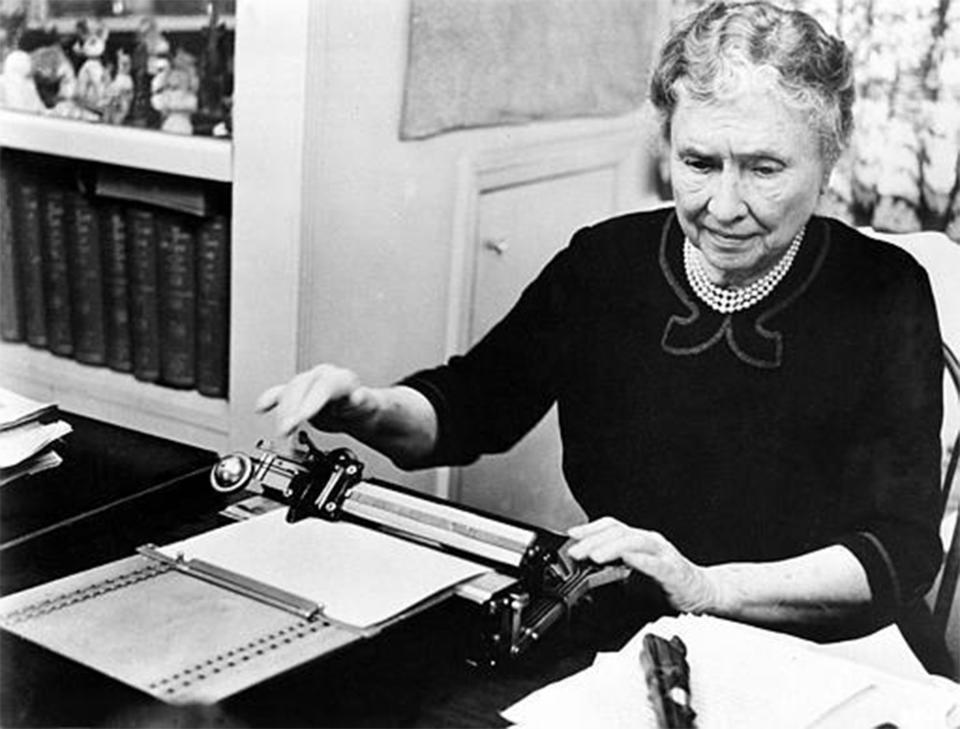Helen Keller was the first lady of courage
- Oops!Something went wrong.Please try again later.
- Oops!Something went wrong.Please try again later.
Alabamian Helen Keller, whose birthday is June 27, was admired around the world. Though deaf and blind, she learned to speak several languages. She authored several books. She starred as herself in the 1919 film “Deliverance,” about her challenging personal journey to a successful life. Keller died 55 years ago.
Miss Keller’s 1919 film, where she and “Teacher” Anne Sullivan appeared as themselves, was not her only film appearance. In 1954, she appeared in the film documentary “Helen Keller in Her Story.” The film, also known as “The Unconquered,” premiered in Birmingham that year. It was released nationally on Keller’s 75th birthday in June 1955. “Helen Keller in Her Story” received a 1956 Academy Award as Best Documentary.
The Associated Press reported that the film was a “sleeper” meaning that it was a small film production that made a big hit with the judges at the Motion Picture Academy of Arts and Sciences, the organization that sponsors the annual Academy Awards. The AP said that “Helen Keller in Her Story,” had only one theatrical booking in the 18 months since it was made. While Miss Keller was a greatly admired American, theater owners believed that the film would be too sad for ticket-buying audiences.

To combat the stereotype that a film about a disabled person would make audiences sad, Miss Keller’s supporters, including acclaimed actress Katherine Cornell, who narrated “Helen Keller in Her Story,” wrote newspaper editors to tell readers that the film did not depict Miss Keller as a sad person. She stressed that Miss Keller was actively learning, traveling, writing, and lecturing. Cornell, a friend of Miss Keller, gave readers the impression that blindness and deafness were incidental to Miss Keller’s active life. In 1954, Alabamians already knew that Helen Keller had overcome her disability. She was happy and Alabama was happy for her.
Other of Miss Keller’s supporters give their enthusiastic support to the “Helen Keller in Her Story.” “Never have I left the theater with such a feeling of happy excitement,” actress Mary Martin said about the film. Acclaimed playwright Joshua Logan said: “It is a happy experience that I will never forget.” Actress Dorothy Gish said: “In all my years in theater and film, this is the most inspiring thing I have ever seen.” Actress Billie Burke, who played Glenda the Good Witch in 1939’s “The Wizard of Oz,” gave her charming support to the film saying it “captures the mind, touches the heart, and stirs the soul.”
On Sunday, June 26, 1955, C.B.S. broadcast “Helen Keller in Her Story” as a special to commemorate Miss Keller’s 75th birthday. CBS’ Arthur Godfrey, the biggest TV celebrity of the era, introduced the film. TV gave the film its greatest audience.
“Helen Keller in Her Story” is an outstanding film about an outstanding Alabamian. It shows Miss Keller with Mark Twain, actors Mary Pickford, Douglas Fairbanks, Sr., and Cahrlie Chaplin, violinist Jascha Heifetz, mezzo-soprano Gladys Swarthout, and legendary choreographer Martha Graham. Miss Keller’s admirers were legion.
“The Miracle Worker,” a 1957 TV production based on Keller’s life, captured a large audience on Playhouse 90. It was expanded into a successful Broadway play. In 1962, a film version with actresses Anne Bancroft, as “Teacher” Anne Sullivan, and Patty Duke as a young Helen was a box office success. Both actresses received Academy Awards.
Helen Keller, age 88, died in June 1968. At the time, Alabama was still mourning the death of Governor Lurleen Wallace, who had died in May.
Of Miss Keller, President Lyndon Johnson said: “The gifts she has left behind — the gifts of character and conviction — are America’s most precious heritage.”
Then-Governor Albert Brewer said, “The people of Alabama mourn the passing of Helen Keller, the beloved Alabamian who through her determination and perseverance overcame her handicap and was an inspiration to thousands of others similarly affected. Miss Keller, through her lifetime, brought a great deal of fame to her native state.”
The Birmingham Post Herald, in an editorial titled “Great Lady,” said that Miss Keller “may well be remembered longer, and with more reason, than any other person ever born in this state.” The paper recalled that when Miss Keller learned to communicate with others by the manual alphabet spelling of “water,” she wrote: “Delicious sensations rippled through me and sweet things that were locked up in my heart began to sing.” The editorial ended: “The song which sounded in Helen Keller’s heart that day will be heard as long as courage and determination have meaning.”
Pioneering psychologist William James wrote to tell Miss Keller, “The sum of it is that you are a blessing.”
Helen Keller was a blessing to Alabama, America, and the world.

James Patterson is a life member of the Auburn University Alumni Association. His mom was named Helen in honor of Helen Keller.
This article originally appeared on Montgomery Advertiser: Helen Keller was the first lady of courage

